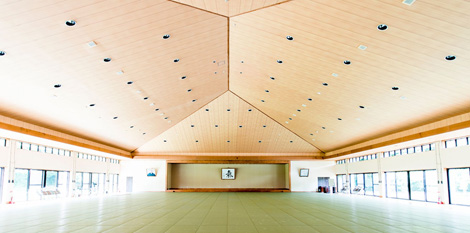Work is typically done with [or for] someone, so there is usually a “deadline” for any work.
Deadlines are very important especially in teamwork. If someone on the team does not meet their deadline, not only does the overall flow of work stall, but also it makes it impossible [for other team members] to progress work with peace of mind.
Just as in Japan, the traffic rule is to drive on the left side of the roadway, but the roads will not function nor will be safe to drive on, if even one person says “I don’t care – I can drive on the right side”.
Without trust, society or work would not be viable.
One time when I was a Uchideshi, I failed to keep an important deadline.
Not that I thought the deadline was unimportant, of course, but unforeseen circumstances made it impossible for me to make the deadline.
I apologized politely to the other party, and explained the reason why I could not make the deadline. In truth, however, I was thinking I really didn’t have a choice.
Koichi Tohei Sensei must have heard about it. I was summoned by Tohei Sensei.
“What was the matter? You didn’t keep the deadline?”
I explained the circumstances, including the fact that I had every intention to keep the deadline. I expected to be scolded, but his words were unexpected.
“Oh, so you were not really willing (literally: “did not have the Ki”) to keep the deadline, then.”
I had just explained to him that I had every intention to keep the deadline. I was only late for reasons about which I had no choice.
There was no doubt that it was my fault, but he was telling me I was not willing to keep the deadline. I was not able to understand him.
Koichi Tohei Sensei then continued.
“You had an intention of keeping the deadline, but you were working just in time to meet deadline. If you get sick in bed [in that situation], you [certainly] wouldn’t be able to keep the deadline. [In the same way,] if the situation like this time happens, you can’t make the deadline. You didn’t extend/have Ki [real intention] to make sure you could meet the deadline even when unforeseen circumstances arise.”
Oh, I see. I thought I was making my best effort, but my Ki was certainly not moving [toward it].
It is precisely because my Ki moves forward, “making sure I make the deadline”, that my “Honki” (True Ki) conveys seriousness/earnestness/sincerity to the other person. This, in turn, builds trust with the other person. Certainly, no one would have trusted me with the way I acted prior to this.
Since then, I began to make an effort to always keep the deadline, even when unforeseen circumstances arise.
I actually have been helped by this effort one time.
As a young instructor, I had a possibility of being given an opportunity to teach at a corporation, and one day, I was supposed to visit and talk with their representative.
It was a cold winter day, and it looked as if it would snow at any moment.
Not wanting to be late for the appointment in case public transportation was disrupted, I arrived an hour early and adjusted my time at a cafe near the office.
When I visited a little before the appointed time, the representative was waiting for me and [right out] said, “We would like to have you provide us the training.”
I was quite surprised, and asked the reason for the immediate offer, even though I knew I might be rude for asking.
The representative said that he happened to see me waiting at the cafe one hour before the appointment and could see my ”sincerity toward keeping the appointment”, so he decided he could trust me.
He said that a person with such “shisei” [attitude/posture] would also take good care of his company.
I am still in contact with this person today even after 25 years. For the first time, then, I understood that what Koichi Tohei Sensei was talking about was not the rule [of always keeping one’s deadline no matter what], but having “Honki” (True Ki) such that a person has a serious, sincere, and earnest intention to make sure the deadline is kept.
It is precisely through our “Honki” (True Ki) that our intention is conveyed to others. I would like to make this a year of “Honki”.
Translated by Mayumi Case
Edited by David Shaner
Eastern Ki Federation
https://easternkifederation.org/
Original article in Japanese: 本氣だから伝わる (Honki dakara Tsutawaru)
January 9, 2024
https://shinichitohei.com/japanese/04-%e3%83%a1%e3%83%bc%e3%83%ab%e3%83%9e%e3%82%ac%e3%82%b8%e3%83%b3/27763/


